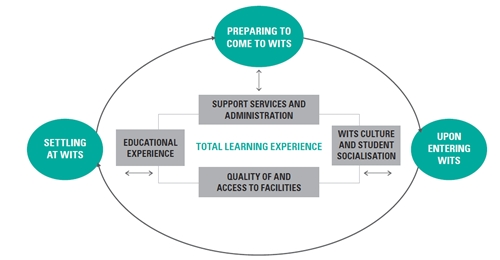
Feedback from first-year undergraduate students -The Wits experience
Ntsundeni Mapatagane
The opinions of first-year students about their total learning experience at university are sought by most educational institutions worldwide, generally in the form of a satisfaction feedback questionnaire. Against the backdrop of high drop-out and student failure rates at the undergraduate level in South African universities, such feedback is vital in helping universities to put in place responsive mechanisms that address student needs through the necessary support mechanisms. An interesting aspect of student satisfaction surveys is their link to quality control, given the increasing number of students enrolling in South African universities, it is important to maintain quality in teaching and research programmes as this is a strong determinant in accessing more government funding.
Drawing on surveys conducted by the Strategic Planning Division at Wits between 2011 and 2013 on first-year student experience, a meta-analysis was conducted in 2016 as part of the Siyaphumelela project initiative. The First-Year Experience Survey was established with an intention of understanding the first year students’ satisfaction levels with regard to various institutional arrangements and general culture of the University. The purpose of this meta-analysis was to establish the trends in student perceptions and the general outlook of the institution across the three year interval/period (2011-2013). With this analysis the institution should be in a better position to align its resources and efforts on areas where they are most needed. While the three survey questionnaires were identical in most respects, a series of additional items related to student expectations and use of learning technologies, extramural activities and institutional culture provides new benchmarks for future monitoring. In the past five years since the 2011 survey, the pace of change in South African higher education has been dramatic on all fronts i.e. transformation issues, curriculum reforms, language policies and the fees crisis. The conjunction of the pressures arising from the expansion in student numbers, innovations in teaching and learning, and the intense market competition between universities, have changed the landscape of higher education. In particular, the context for undergraduate students commencing university has been changed with increased choice and flexibility in course design and models of delivery, and the introduction of a range of institutional strategies to improve transition from school to university.
The study used the conceptual framework (Figure 1) informed by support and socialisation mechanisms to establish what student support first-year students need; how the University has responded to those needs; what perceptions they hold about student-centeredness at Wits; and their levels of satisfaction in relation to the total learning experience during their first year at Wits.

The framework consists of three organizing phases (1) preparing to come to Wits, (2) upon entering Wits, and (3) settling at Wits. The study seeks to establish how student experiences in these three organizing phases shape the total learning experience of the Wits first-year students. The study poses questions in relation to (1) support services and administration, (2) quality of and access to facilities, (3) the educational experience, and (4) the Wits culture. These questions were linked to the three organizing phases identified above.
The analysis of the data shows that student reasons for coming to university continue to remain remarkably stable, despite predicted changes as a result of shifts in the economic environment. More than 90% of the students in all the three years of the survey indicated that: ‘attending university is definitely most satisfying’, this suggests that improving job prospects is high on the agenda of most first year students.
Although feedback on the contents of the orientation program was satisfactory, the university should avoid information overload during orientation and unnecessary bureaucratic procedures in an increasingly complex environment. A week-long programme (or longer) has proven to bear positive results. However, the university should ensure that it is linked to the programme of study and involve active participation by students. If this involves informal contact with staff as well this appears to be beneficial. This has proven to be very beneficial for the Faculty of Health Sciences, with the lowest drop-out rates and failure rates in all the other faculties. Orientation is important for retention, mainly because it provides an opportunity to assist adjustment and integration.
It is unfortunate that the university only accommodates 10% of its students in the university residences. Questions on accommodation only focussed on interrogating the administration and arrangements of student residences. They were not focused on whether the residence create a conducive environment to enhance learning activities. There is ambiguous evidence about whether residential status enhances first year performance and retention. However, university residence does seem to enhance a sense of social integration but the impact on grades is unknown, although it may aid the development of critical thinking. The beneficial effects of residential living seem to be dependent on the context and may be more beneficial in small institutions. It is worth exploring in future studies whether it is beneficial for students to live and learn together in the Wits context.
There are somewhat contradictory findings in the literature concerning students’ motivation. According to “The Developmental Disconnect in Choosing a Major: Why Institutions Should Prohibit Choice until Second Year - The Mentor,” n.d.by Freedman (2013); an estimated 20 to 50% of students enter higher education as “undecided” and an estimated 75% of students change their field of study at least once before graduation. Furthermore, it is also important to note that “decided” students are not necessarily basing their decision of the field of study on factual research and self-reflection. In a study by Beggs et. al. (2008), when students were asked to elaborate on their career decision-making process, factors that played a role included: general interest the student had in the subject they chose; family and peer influence; assumptions about introductory courses; potential job characteristics, and characteristics of the major. While these may be valid factors to a degree, the study ultimately implied that students are choosing their field of study based on influence and assumption rather than through an understanding of their own personal goals and values. The choice of the field of study can have a significant positive or negative effect on the student experience, affecting retention, engagement, student learning, academic standing, and setting of academic and career goals.
The high drop-out rates and failure rates in the first year of study indicates that some students have a very uncertain start at university, generally through a combination of factors which can include lack of accurate initial information poor course choices, unrealistic expectation of the amount of work and time involved in the university study. The findings on this section of the report sets precedence for future research on the following research questions:
1.What percentage of the students enter the university undecided? What interventions can be put in place to better prepare the students?
2.What percentage of students are planning to change their programme choice and why? How can the university respond to this challenge in order to increase student success?
3.What motivates students to make their career choices? How can the university enhance its marketing strategies to ensure that prospective students receive useful information that will help them make the right career choices?
Ill-informed choices can lead to a chain reaction of unrealised expectations, dissatisfaction and demotivation (Harvey et. al., 2006)
On the academic experience, it is very comforting that the analysis shows that the majority of the students find that lectures are a valuable source of information. More than 80% of the students agreed with the statement that “I take very careful notes during class, and I review them thoroughly before a test”. The fact that students increasingly have access to sources of information other than lectures is likely to contribute to this finding. A rather more concerning finding is an increase in the percentage of students who say that they don’t know how to study on their own; so too is the increase in the percentage of students who find it difficult to motivate themselves to study.
In general, student expectation about the amount of work they are required to do, the amount of time they have to spend on studies and the pressure on them are not too far off the mark, although there is a tendency to under-estimate rather than over-estimate what is expected of them, especially as far as general pressure of work is concerned. The general impression from the analysis of the three year of the survey is that the majority of students are diligent in their approach to their work.
In future surveys, the University should include questions on the use of teaching and learning technologies. This will help the University to analyse the trends and impact of the web-based resources and information designed specifically for courses, and interactive multi-media software designed specifically for courses and these could be widespread across the different faculties. This can also include on-line discussion groups and virtual tutoring if they are well developed and used by the majority of students in a particular faculty.
While the study shows that first-year undergraduate students at Wits are predominantly satisfied with various institutional arrangements and the general culture of the University, there are also areas that need special attention and strategic investment of resources. These include: improving student participation in the First-Year Experience Programme; becoming more student-centred to improve the student experience of first-year students; exploring more mechanisms to reduce the drop-out rate and improve student throughput; improving the quality of student support across all professional and administrative services; and improving the quality of feedback on student assessment tasks for purposes of enhancing learning.
References
Freedman, L. (2012). The Developmental Disconnect in Choosing a Major: Why Institutions Should Prohibit Choice until Second Year. Butler University. The mentor an academic advising journal
Beggs, J., Bantham, J., and Taylor, S. (2008). Distinguishing the factors influencing college students’ choice of major. College Student Journal, 42(2), 381–394.
Harvey, L., Drew. S. and Smith, M. (2006). The first-year experience: a review of literature for the Higher Education Academy, York:HEA

